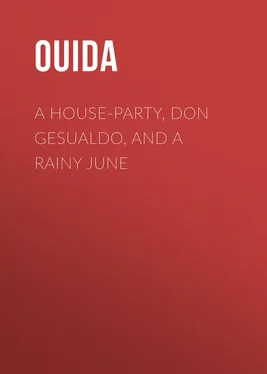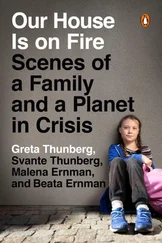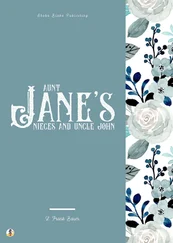Ouida - A House-Party, Don Gesualdo, and A Rainy June
Здесь есть возможность читать онлайн «Ouida - A House-Party, Don Gesualdo, and A Rainy June» — ознакомительный отрывок электронной книги совершенно бесплатно, а после прочтения отрывка купить полную версию. В некоторых случаях можно слушать аудио, скачать через торрент в формате fb2 и присутствует краткое содержание. Жанр: foreign_prose, literature_19, foreign_antique, на английском языке. Описание произведения, (предисловие) а так же отзывы посетителей доступны на портале библиотеки ЛибКат.
- Название:A House-Party, Don Gesualdo, and A Rainy June
- Автор:
- Жанр:
- Год:неизвестен
- ISBN:нет данных
- Рейтинг книги:4 / 5. Голосов: 1
-
Избранное:Добавить в избранное
- Отзывы:
-
Ваша оценка:
- 80
- 1
- 2
- 3
- 4
- 5
A House-Party, Don Gesualdo, and A Rainy June: краткое содержание, описание и аннотация
Предлагаем к чтению аннотацию, описание, краткое содержание или предисловие (зависит от того, что написал сам автор книги «A House-Party, Don Gesualdo, and A Rainy June»). Если вы не нашли необходимую информацию о книге — напишите в комментариях, мы постараемся отыскать её.
A House-Party, Don Gesualdo, and A Rainy June — читать онлайн ознакомительный отрывок
Ниже представлен текст книги, разбитый по страницам. Система сохранения места последней прочитанной страницы, позволяет с удобством читать онлайн бесплатно книгу «A House-Party, Don Gesualdo, and A Rainy June», без необходимости каждый раз заново искать на чём Вы остановились. Поставьте закладку, и сможете в любой момент перейти на страницу, на которой закончили чтение.
Интервал:
Закладка:
"A very pretty letter," says Brandolin. "Many thanks." And he restores it to its owner.
"Bunkum!" says Usk.
"Not a bit in the world," says his wife, with contempt and indignation. " She does not 'pose,' if you do!"
"My dear George," says Brandolin, "you are one of those thorough-going Britons who always think that everybody who doesn't deal in disagreeable remarks must be lying. Believe me, there are people who really see 'the side that's next the sun,'—even in a crab-apple."
"And deuced irritating, too, they are," says Usk, with emphasis. "'What a beastly bad day,' one says to 'em when it's pouring cats and dogs, and they answer, 'Oh, yes, but rain was so wanted we must be thankful.' That's the kind of answer that would make a saint swear."
"You are not a saint, and you swear on small provocation," replies Brandolin. "To look at rain in that light argues true philosophy. Unfortunately, philosophy is too often strained to bursting in our climate, by having to contemplate rain destroying the crops. If we only had rain when we wanted it, I think the most unreasonable among us would view it with equanimity."
Rain is at that moment running down the painted panes of the Surrenden casements, and driving across the lawns and terraces of the Surrenden gardens. It makes Usk very cross: all the ensilage in the world will not console him for ripening corn beaten down in all directions, and young families of pheasants dying of cramp and pip in their ferny homes.
"Dig a big pit and cram your soaked grass into it: very well, I don't say no," he growls. "But what about your mildewed wheat? And where should we be if we had to undergo a blockade? I'm not against making more pasture, grazing's all very well; but if there's a war big enough to sweep the seas of the grain-ships that come to us from the Colonies and the United States, where shall we be if we've nothing to eat but our own beef and mutton? Beef and mutton are solid food, but I believe we should all go mad on them if we'd no bread to eat too."
"I'm all for pasture," replies Brandolin; "and as the British Isles can never, under any cultivation whatever, feed all their population, we may as well dedicate ourselves to what is picturesque. I am fascinated by Laveleye's portrait of England when she shall have turned grazier exclusively: it is lovely: 'L'Angleterre redeviendra ce qu'elle était sous les Tudors, un grand parc vert, parsemé d'ormes et de chênes, où b[oe]ufs et moutons se promeneront dans des prairies sans limites.'"
"'Prairies sans limites?' when the land's to be all sliced up in little bits between peasant proprietors!" says Usk.
"I don't think Laveleye believes in peasant proprietors, though he is a professor of social economy."
"Social economy!" says Usk, with a groan. "Oh, I know that fool of a word! In plain English, it means ruin all round, and fortune for a few d–d manufacturers."
"The d–d manufacturer is the principal outcome of two thousand centuries of Christianity, civilization, and culture. The result is not perfectly satisfactory or encouraging, one must admit," says Brandolin, as he reaches down a volume of eighteenth-century memoirs, and adds, with entire irrelevancy to manufacturers or memoirs, "Is she really as handsome as your children tell me?"
"Who?" asks Usk. "Oh, the Russian woman: yes, very good-looking. Yes, she was here at Easter, and she turned their heads."
"Has she any lovers older than Babe?"
"She has left 'em in Russia if she has."
"A convenient distance to leave anything at: Italy and Russia are the only countries remaining to us in which Messalina can still do her little murders comfortably without any fuss being made."
"She isn't Messalina, at least I think not. But one never knows."
"No, one never knows till one tries," says Brandolin. And he wishes vaguely that the Russian woman were already here. He is fond of Surrenden, and fond of all its people, but he is a little, a very little, bored. He sees that all Lady Usk's doves are paired, and he does not wish to disturb their harmony, possibly because none of the feminine doves attract him. But he cannot flirt forever with the children, because the children are not very often visible, and without flirting civilized life is dull, even for a man who is more easily consoled by ancient authors off the library-shelves than most people can be.
This conversation occurs in the forenoon in Lady Usk's boudoir. In the late afternoon in the library over their teacups the ladies talk of Xenia Sabaroff. It is perceptible to Brandolin that they would prefer that she should not arrive.
"Is she really so very good-looking?" he asks of Mrs. Wentworth Curzon.
"Oh, yes," replies that lady, with an accent of depreciation in her tones. "Yes, she is very handsome; but too pale, and her eyes too large. You know those Russian women are mere paquets de nerfs , shut up in their rooms all day and smoking so incessantly: they have all that is worst in the Oriental and Parisienne mixed together."
"How very sad!" says Brandolin. "I don't think I have known one, except Princess Kraskawa: she went sleighing in all weathers, wore the frankest of gingerbread wigs, and was always surrounded by about fifty grandchildren."
Princess Kraskawa had been for many years ambassadress in London.
"Of course there are exceptions," says Nina Curzon; "but generally, you know, they are very depraved, such inordinate gamblers, and so fond of morphine, and always maladives ."
"Ah," says Brandolin, pensively, "but the physical and moral perfection of Englishwomen always makes them take too high a standard: poor humanity toils hopelessly, and utterly exhausted, many miles behind them."
"Don't talk nonsense," says Mrs. Curzon; "we are no better than our neighbors, perhaps, but we are not afraid of the air, we don't heat our houses to a thousand degrees above boiling-point, we don't gamble,—at least not much,—and we don't talk every language under the sun except our own, and yet not one of them grammatically."
"Decidedly," reflects Brandolin, "Lawrence must have looked too often at Madame Sabaroff."
"Sabaroff is dead, isn't he?" he asked, aloud. "You know I have been out of society for a year: the whole map of Europe gets altered in one's absence."
"Sabaroff was shot in a duel four years ago," replies Mrs. Curzon,—"a duel about her."
"What a fortunate woman! To get rid of a husband, and to get rid of him in such interesting circumstances! C'est le comble de bonheur! "
"That depends. With her it resulted in her exile from court."
"Oh, to be sure; when Russians are naughty they are sent to live on their estates, as riotous children are dismissed to the nursery. Was she compromised, then?"
"Very much compromised; and both men were killed, for the adversary of Sabaroff had been wounded mortally, when, with an immense effort, he fired, and shot the prince through the lungs."
"A pretty little melodrama. Who was the opponent?"
"Count Lustoff, a colonel of the Guard. I wonder you did not hear of it: it made a stir at the time."
"I may have heard: when one doesn't know the people concerned, no massacre, even of the Innocents, makes any impression on one. And the result was that the lady had to leave the imperial court?"
"Yes: they do draw a line there ."
Brandolin laughs; it tickles his fancy to hear Mrs. Wentworth Curzon condemning by implication the laxity of the court of St. James.
"They can't send us to our estates," he replies, "the lands are so small and the railways are so close. Else it would have a very good effect if all our naughty people could be shut up inside their own gates, with nobody to speak to but the steward and the rector. Can you imagine anything that would more effectively contribute to correct manners and morals? But how very desolate London would look!"
Читать дальшеИнтервал:
Закладка:
Похожие книги на «A House-Party, Don Gesualdo, and A Rainy June»
Представляем Вашему вниманию похожие книги на «A House-Party, Don Gesualdo, and A Rainy June» списком для выбора. Мы отобрали схожую по названию и смыслу литературу в надежде предоставить читателям больше вариантов отыскать новые, интересные, ещё непрочитанные произведения.
Обсуждение, отзывы о книге «A House-Party, Don Gesualdo, and A Rainy June» и просто собственные мнения читателей. Оставьте ваши комментарии, напишите, что Вы думаете о произведении, его смысле или главных героях. Укажите что конкретно понравилось, а что нет, и почему Вы так считаете.












